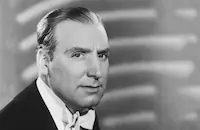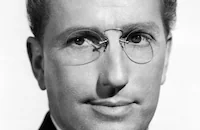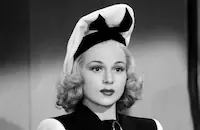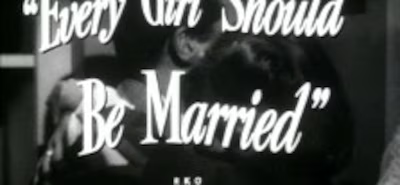Every Girl Should Be Married

Brief Synopsis
Cast & Crew
Don Hartman
Cary Grant
Franchot Tone
Diana Lynn
Betsy Drake
Alan Mowbray
Film Details
Technical Specs

Synopsis
Single salesclerk Anabel Sims yearns to become a devoted wife and mother, but bemoans the social restrictions forced upon women during courtship. While discussing the matter at a soda fountain with her girl friend, Julie Howard, Anabel sees Dr. Madison W. Brown and is immediately taken with him. By coincidence, Anabel meets Madison again when he comes to buy baby booties at Sanford's, the department store where she works. After determining that Madison is a doctor and unmarried, Anabel shows up at his office claiming to be ill, unaware that he is a pediatrician. Although Madison, a confirmed bachelor, discourages her interest in him, Anabel determines to trap the doctor and begins researching his life in detail. Feeling that the only way to win Madison is to make him jealous, Anabel poses as her employer Roger Sanford's secretary and makes a reservation under his name at Pierre's, a restaurant she knows Madison frequents. In an expensive gown she has borrowed from Sanford's dress department, Anabel then coaxes Madison to join her at Roger's table and pretends that she is waiting for her rich lover. Madison is not fooled, however, and demands to know why she is chasing him. After the quick-thinking Anabel claims that she is merely using him to make Roger jealous, Roger unexpectedly arrives. To her relief, Roger, who is an old college friend of Madison's, pretends to know Anabel, and she confesses her entire scheme to him. Roger, a notorious playboy, assumes that Anabel's confession is a ruse to attract him and takes her home. The next day, Anabel, who has been demoted for rejecting Roger's advances, spies Madison on the street and kisses Roger, who also happens to be walking by, to make him jealous. Madison is unimpressed, but the kiss is captured on film by a photographer and makes headlines the next morning. While Roger accuses Anabel of trying to blackmail him, she condemns him as a womanizer. Later, she is offered a free car from an insurance salesman, who is eager to capitalize on her supposed relation to the store tycoon. Using the situation to her advantage, Anabel finagles a rent-free month in a model house by insinuating that Roger might invest in the development. Madison then hears from his barber, masseur and the clerk who sells him tobacco that, despite the rumors, Anabel is really in love with another man. Seeing through her latest ploy, Madison finds Anabel at the soda fountain and informs her that her maneuvers are failing. Undaunted, Anabel shows up at a lecture given by Madison and, in front of a supportive, all-female crowd, condemns him for selfishly resisting marriage. When his hostile reaction to Anabel's words causes some of his patients to cancel their appointments, a fed-up Madison calls Anabel and arranges to have dinner with her. Although Anabel lovingly prepares Madison's favorite foods, the equally determined Madison tells her that he does not love her and advises her to go back home to Joe, her hometown sweetheart. Anabel is crushed by Madison's defiant rejection and is unprepared for Roger's sudden renewed interest in her. Roger, a three-time divorcé, proposes to Anabel, claiming that her reaction to Madison's rejection has kindled a competitive flame in him. Still dazed, Anabel turns down the proposal, but invites the lovestruck Roger for dinner. Julie then tells Madison that Anabel is running to Roger "on the rebound" and advises him to intervene before Anabel makes a foolish mistake. Although suspicious, Madison shows up at Anabel's and confronts Roger about his "intentions." Before long, Joe suddenly arrives at the house, announcing that he and Anabel are soon marrying. Madison at first rejoices at the news, but later tells Anabel that she should marry Joe only if she truly loves him. After announcing to sincere bumpkin Joe that Anabel pursued him relentlessly, Madison surprises himself by proposing to her. Seeing Anabel's obvious love for the doctor, Joe bids the couple a noble goodbye. As soon as he is out the door, however, Madison reveals that he knows that "Joe" is really radio performer Harry Proctor and praises Anabel for her ingenuity. He then welcomes the minister whom Anabel had summoned in anticipation of her success and sits down to discuss their wedding plans.

Director

Don Hartman
Cast

Cary Grant

Franchot Tone

Diana Lynn

Betsy Drake

Alan Mowbray

Elisabeth Risdon

Richard Gaines
Harry Hayden
Chick Chandler
Leon Belasco
Fred Essler
Anna Q. Nilsson

Eddie Albert
Charmienne Harker
Marjorie Walker
Alvina Tomin
Rosalie Coughenour
Joanne Lybrook
Louise Franklin
Dan Foster
Gwyn Shipman
Arnolda Brown
Jean Andren

Elaine Riley
Lois Hall
Pat Hall

Carol Hughes
Claire Du Brey
Helen Brown
Kate Lawson

James Griffith
Al Rhein
Joseph Granby
Selmar Jackson

Anne Nagel
Crew
Stephen Morehouse Avery
C. Bakaleinikoff
Gordon Bau
Emmett Bergholz
Carroll Clark
Russell A. Cully
Albert S. D'agostino
George E. Diskant
Leigh Harline
Don Hartman
Don Hartman
Don Hartman
Harry Marker
Clem Portman
Hazel Rogers
Ruby Rosenberg
Sam Ruman
Francis Sarver
Dore Schary
William Shanks
Sharaff
Darrell Silvera
William Stevens
Rod Tolmie
Charles Trenet
Ralph Wildman

Photo Collections
Film Details
Technical Specs

Articles
Every Girl Should Be Married
Life imitated art for stars Cary Grant and Betsy Drake, who were married in real life one year after the film's release. Drake, the granddaughter of Chicago's Drake Hotel founder, was Grant's third wife. The couple had met a year earlier aboard the luxury liner Queen Mary traveling from England back to the United States. Formally introduced to each other by actress and fellow passenger Merle Oberon, Grant and Drake became friends and soon were romantically involved. At the time, Drake was a stage actress from America with no film credits to her name, but Cary Grant saw her potential.
When Grant returned to Hollywood after the trip, he convinced Dore Schary, head of production at RKO, to sign Betsy Drake to a contract. Not surprisingly, Every Girl Should Be Married became one of Grant's next film projects and he convinced Schary to let Drake be his co-star despite her lack of on-screen experience. Initially, the role was intended for Barbara Bel Geddes and Drake resisted having such a high profile silver screen debut, but Grant convinced her that she was ready. He wanted so much for her to shine in the picture that he used his substantial influence on everyone of importance from the producer to the director to screenwriter Don Hartman. Grant made sure he had a say in anything that concerned Drake's performance from lighting to dialogue. In fact, he may have gone overboard. According to Charles Higham and Roy Moseley, authors of Cary Grant: The Lonely Heart, "Cary watched every move Betsy made on the set, endlessly checking her out, imitating her cruelly in scenes, and at times encouraging her - mistakenly - to imitate Katharine Hepburn's mannered playing. Betsy seemed to take on Cary's own fussiness, and soon studio publicists would be complaining that she was excessively concerned over her appearance on the screen. Self-conscious over her thinness, she refused to pose in a bathing suit."
In the end, the gamble on neophyte Betsy Drake, who carries the bulk of the film, paid off. Released with fanfare as RKO's big Christmas offering, Every Girl Should Be Married was a financial success. Drake's endearing natural quality won audiences over, making her character's questionable behavior, which might be called stalking by today¿s standards, seem comic and innocent. After all, what girl wouldn't pull out all the stops for Cary Grant?
Cary Grant and Betsy Drake were married for nearly 13 years, which was the longest of Grant's five marriages. The couple made one more film together Room for One More (1952) before divorcing in 1962. Drake gave up acting soon after, making her final screen appearance in Clarence, the Cross-Eyed Lion in 1965. Grant, a screen legend, continued making movies until his unofficial retirement in 1966.
Producer: Dore Schary, Don Hartman
Director: Don Hartman
Screenplay: Stephen Morehouse Avery, Eleanor Harris, Don Hartman
Cinematography: George E. Diskant
Film Editing: Harry Marker
Art Direction: Carroll Clark, Albert S. D'Agostino
Music: Leigh Harline
Cast: Cary Grant (Dr. Madison Brown), Franchot Tone (Roger Sanford), Diana Lynn (Julie Hudson), Betsy Drake (Anabel Sims), Alan Mowbray (Mr. Spitzer), Elisabeth Risdon (Mary Nolan).
BW-85m. Closed captioning.
by Andrea Passafiume

Every Girl Should Be Married
Eddie Albert (1906-2005)
The son of a real estate agent, Albert was born Edward Albert Heimberger in Rock Island, Ill., on April 22, 1906. His family relocated to Minneapolis when he was still an infant. Long entralled by theatre, he studied drama at the University of Minnesota. After years of developing his acting chops in touring companies, summer stock and a stint with a Mexican circus, he signed a contract with Warner Bros. and made his film debut in Brother Rat (1938). Although hardly a stellar early film career, he made some pleasant B-pictures, playing slap happy youths in Brother Rat and a Baby (1940), and The Wagons Roll at Night (1941).
His career was interrupted for military service for World War II, and after his stint (1942-45), he came back and developed a stronger, more mature screen image: Smash-Up: The Story of a Woman (1947); Carrie (1952); his Oscar® nominated turn as the Bohemian photographer friend of Gregory Peck in Roman Holiday (1953); a charming Ali Hakim in Oklahoma (1955); and to many critics, his finest hour as an actor, when he was cast unnervingly against type as a cowardly military officer whose lack of commitment to his troops results in their deaths in Attack! (1956).
As he settled into middle-age, Albert discovered belated fame when he made the move to Hooterville. For six seasons (1965-71), television viewers loved Eddie Albert as Oliver Wendal Douglas, the bemused city slicker who, along with his charming wife Lisa (Eva Gabor), takes a chance on buying a farm in the country and dealing with all the strange characters that come along their way. Of course, I'm talking about Green Acres. If he did nothing else, Alberts proved he could be a stalwart straight man in the most inane situations, and pull it off with grace.
After the run of Green Acres, Albert found two of his best roles in the late stages of his career that once again cast him against his genial, good-natured persona: the fiercly overprotective father of Cybill Shepherd in The Heartbreak Kid (1972), for which he earned his second Oscar® nomination; and the sadistic warden in Robert Aldrich's raucous gridiron comedy The Longest Yard (1974). Soon, Albert was in demand again, and he had another hit series, playing a retired police officer who partners with a retired con artist (Robert Wagner) to form a detective agency in Switch (1975-78).
The good roles slowed down slightly by the dawn of the '80s, both film: The Concorde: Airport '79 (1979), How to Beat the High Co$t of Living (1980), Take This Job and Shove It (1981); and television: Highway to Heaven, Murder, She Wrote, Thirtysomething, offered him little in the way of expansion. Yet, Albert spent his golden years in a most admirable fashion, he became something of activist for world health and pollution issues throughout the latter stages of his life. It is widely acknowledged that International Earth Day (April 22) is honored on his birthday for his tireless work on environemental matters. Albert was married to famed hispanic actress Margo (1945-85) until her death, and is survived by his son, actor Edward Albert, a daughter, and two granddaughters.
by Michael T. Toole
Eddie Albert (1906-2005)
Quotes
Trivia
Weegee was famous as a street photographer - primarily in New York City. He also tried his hand without much success at directing movies.
Notes
Don Hartman's screen credit reads: "Produced, directed and co-written by Don Hartman." According to Hollywood Reporter, Barbara Bel Geddes was to star in this picture. Betsy Drake, who made her screen debut in the film, was cast instead. The New York Times review notes that Drake met co-star Cary Grant in London while she was acting in the stage play Deep Are the Roots. Grant was "reportedly intrigued by her evident talent and charm," and "when she came home...she went to Hollywood, called Mr. Grant, who arranged a screen test for her...." Modern sources claim that Grant not only supervised a rewrite of Drake's role to include some of her mannerisms, but directed much of the finished film as well. Modern sources also state that Grant instructed Drake to play the part like a young Katharine Hepburn. In its review, Variety praised Drake, stating, "In a long part that keeps her within camera range for the full length of the film, Miss Drake's performance is a tour de force in the romantic comedy vein." The New York Times review compared Drake favorably to Margaret Sullavan and called her a "refreshingly natural comic spirit" with "considerable promise of more formidable triumphs on the screen." Drake and Grant were married in 1949 and divorced ten years later. They appeared in one more film together, the 1952 picture Room for One More. Actress Lois Hall, who starred in adventure serials in the early 1950s, made her motion picture debut in Every Girl Should Be Married. Modern sources note that the film was RKO's most lucrative production of 1948, making $775,000 in profits. Grant and Drake reprised their roles in a June 27, 1949 Lux Radio Theatre broadcast.

Miscellaneous Notes
Released in United States Fall November 9, 1948
Released in United States on Video February 1988
Released in United States on Video September 27, 1989
Broadcast over TNT (colorized version) November 19, 1989.
Released in United States on Video February 1988
Released in United States on Video September 27, 1989 (colorized version)
Released in United States Fall November 9, 1948














